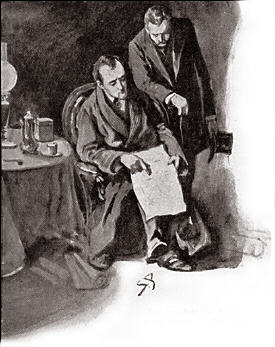| The Problem 4 | The Problem 5 |
“Going out, Watson?”
“Unless I can help you.”
“No, my dear fellow, it is at the hour of action that I turn to you for aid. But this is splendid, really unique from some points of view. When you pass Bradley’s, would you ask him to send up a pound of the strongest shag tobacco? Thank you. It would be as well if you could make it convenient not to return before evening. Then I should be very glad to compare impressions as to this most interesting problem which has been submitted to us this morning.”
I knew that seclusion and solitude were very necessary for my friend in those hours of intense mental concentration during which he weighed every particle of evidence, constructed alternative theories, balanced one against the other, and made up his mind as to which points were essential and which immaterial. I therefore spent the day at my club and did not return to Baker Street until evening. It was nearly nine o’clock when I found myself in the sitting-room once more.
My first impression as I opened the door was that a fire had broken out, for the room was so filled with smoke that the light of the lamp upon the table was blurred by it. As I entered, however, my fears were set at rest, for it was the acrid fumes of strong coarse tobacco which took me by the throat and set me coughing. Through the haze I had a vague vision of Holmes in his dressing-gown coiled up in an armchair with his black clay pipe between his lips. Several rolls of paper lay around him.
“Caught cold, Watson?” said he.
“No, it’s this poisonous atmosphere.”
“I suppose it is pretty thick, now that you mention it.”
“Thick! It is intolerable.”
“Open the window, then! You have been at your club all day, I perceive.”
“My dear Holmes!”
“Am I right?”
“Certainly, but how– –?”
He laughed at my bewildered expression.
“There is a delightful freshness about you, Watson, which makes it a pleasure to exercise any small powers which I possess at your expense. A gentleman goes forth on a showery and miry day. He returns immaculate in the evening with the gloss still on his hat and his boots. He has been a fixture therefore all day. He is not a man with intimate friends. Where, then, could he have been? Is it not obvious?”
“Well, it is rather obvious.”
“The world is full of obvious things which nobody by any chance ever observes. Where do you think that I have been?”
“A fixture also.”
“On the contrary, I have been to Devonshire.”
“In spirit?”
“Exactly. My body has remained in this armchair and has, I regret to observe, consumed in my absence two large pots of coffee and an incredible amount of tobacco. After you left I sent down to Stamford’s for the Ordnance map of this portion of the moor, and my spirit has hovered over it all day. I flatter myself that I could find my way about.”
“A large-scale map, I presume?”
“Very large.” He unrolled one section and held it over his knee. “Here you have the particular district which concerns us. That is Baskerville Hall in the middle.”

“With a wood round it?”
“Exactly. I fancy the yew alley, though not marked under that name, must stretch along this line, with the moor, as you perceive, upon the right of it. This small clump of buildings here is the hamlet of Grimpen, where our friend Dr. Mortimer has his headquarters. Within a radius of five miles there are, as you see, only a very few scattered dwellings. Here is Lafter Hall, which was mentioned in the narrative. There is a house indicated here which may be the residence of the naturalist – Stapleton, if I remember right, was his name. Here are two moorland farmhouses, High Tor and Foulmire. Then fourteen miles away the great convict prison of Princetown. Between and around these scattered points extends the desolate, lifeless moor. This, then, is the stage upon which tragedy has been played, and upon which we may help to play it again.”
| The Problem 4 | The Problem 5 |